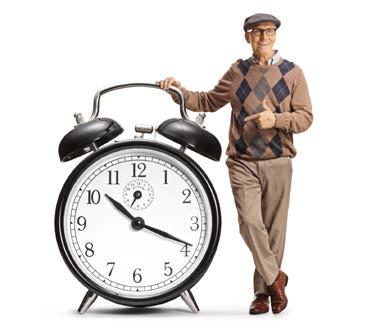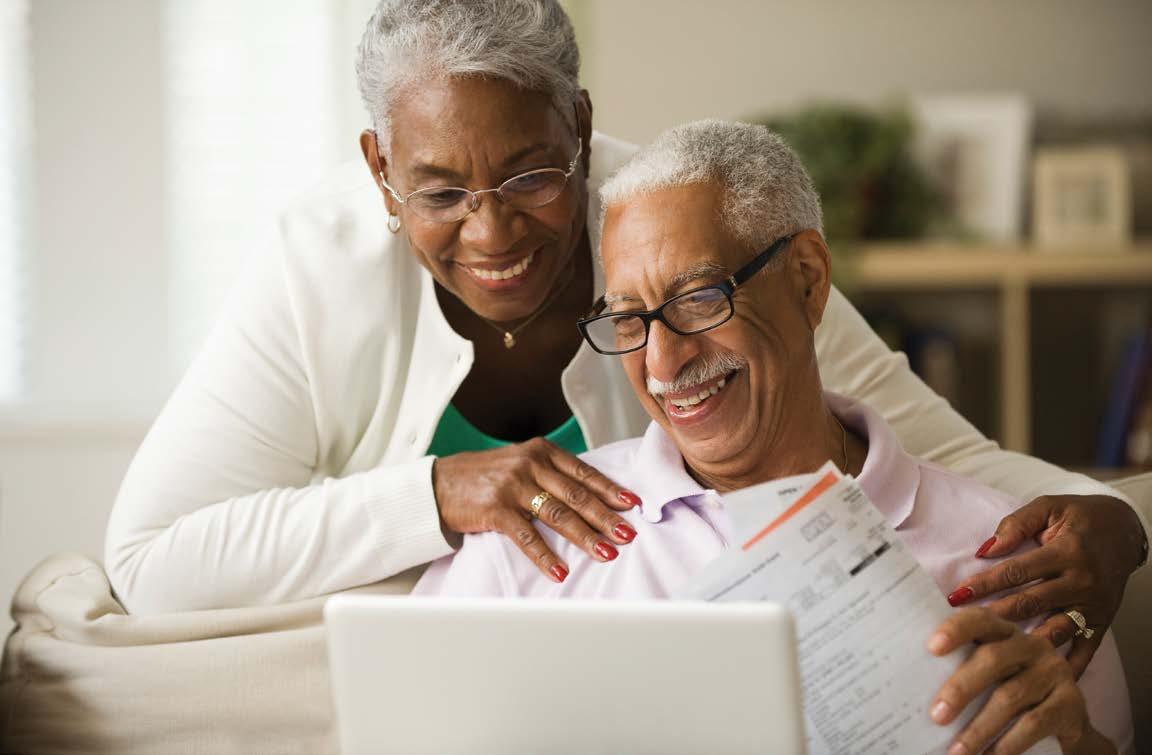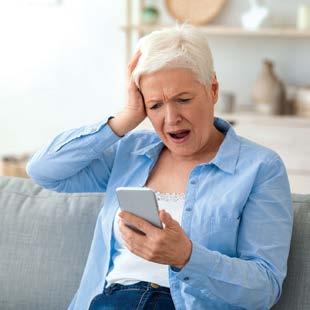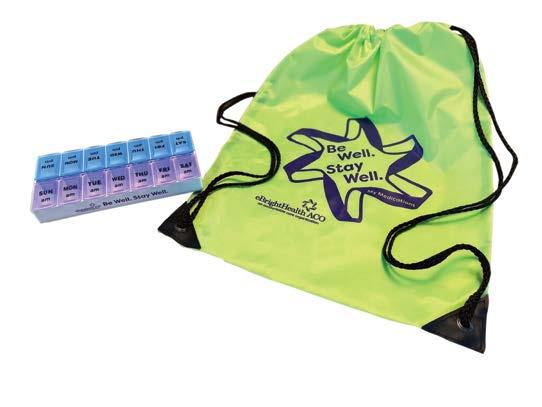News from your Primary Care Team and eBrightHealth ACO


News from your Primary Care Team and eBrightHealth ACO

It’s never been more important to stay socially connected with friends and loved ones, and technology makes that easier than ever with apps, email, phone calls, social media, texts and even video visits. We can even now take care of daily business, such as banking and shopping, from the comfort and convenience of home, too. What a time-saver!
Make sure wellness wins by scheduling your Annual Wellness Visit today!
Check out our new insert for more information.
Before you connect with your fingertips, arm yourself with tools to protect yourself online. Not everything you read on the internet is true, and sadly, not everyone who contacts you has your best interests at heart. Be alert and keep yourself safe as you benefit from the advantages of life online.


We wish everyone was honest, but the reality is you must protect yourself from frauds and scams – especially when you are online. Follow these tips to stay safe while you stay connected:
1. The IRS, Social Security or Medicare will never call or show up at your door asking for personal information or payment, or threaten to arrest you.
2. If you have to pay a fee to collect your prize, you didn’t win.
3. When someone calls or emails to say that you have a computer virus, they are not trying to “fix a problem.”
4. An online romance asking for money is definitely not Mr. or Mrs. Right.
5. Scam emails (phishing) may look like they were sent by friends, loved ones or reputable companies. Think twice before clicking links, and never give passwords or personal information unless you initiated the transaction.
6. “Guaranteed income! Higher returns!” Be careful! Ask friends and family to recommend trusted financial advisors.
Review bank and credit card statements every month.
Check your credit report. Request one free copy a year from AnnualCreditReport.com.
Shred papers containing personal information.
Seek advice from loved ones or trusted professionals before making financial decisions.
Stay informed about scams and frauds targeting older adults.
Report suspected fraud to law enforcement right away.
Sources: FBI, National Council on Aging, AARP
Choosing a strong password can be challenging. Remembering passwords can be even harder. Follow these tips on how to choose a strong password (hint: your initials and birthdate, your pet’s name or password123 are probably not the safest choices!):
• Combine 8-12 letters (upper and lowercase), numbers and characters.
• Change your password often.
• Store passwords in a safe place. Consider using a password manager application.
• Do not put your password or personal identification number (PIN) on your phone case, laptop cover or on your debit card! It might be handy for you if you have trouble remembering, but it gives would-be thieves access to your accounts, too.

Scammers create a sense of urgency, so resist pressure to act quickly. Take a moment to think clearly, and call the police if you feel that you or a loved one are in danger.
• Limit what you post online with privacy settings. Scammers can use personal information from social media to better understand and target you.
• Be careful of pop-up windows on your computer, tablet or cell phone. Shut down your device and disconnect from the internet if a pop-up message locks your screen.
“Treat your password like your toothbrush. Don’t let anybody else use it, and get a new one every six months.”
—CLIFFORD STOLL American astronomer, author and teacher
• If you suspect you are the victim of fraud, immediately contact your financial institution to protect your accounts. Consider freezing your credit so no one can use your name or Social Security number to open a new account.
• Never click on an email or text attachment from someone you do not know.
Sources: FBI, Consumer Financial Protection Bureau, Federal Trade Commission
Blue light from handheld devices and computer screens can strain your eyes, especially when you hold the device close to your face. It can also lead to blurred vision, dry eyes and headaches—and mess up your sleep cycle. Blue light glasses may be helpful, but check with your Primary Care Team or eye specialist first. You’ll also want to watch your posture while you use your devices to prevent neck, shoulder and wrist aches. Aim for no more than two hours of screen time each day and take frequent breaks.
Follow the 20-20-20 rule to reduce digital eye strain: take a 20-second break to look at something 20 feet away every 20 minutes.
The ability to do things online makes life better in so many ways, but sadly not everyone uses technology for good. Be aware and stay alert! “Grandma,Ineedhelp!”
In the Grandparent Scam, fraudsters pretend to be a distressed relative begging for money in an emergency. Scammers may even use artificial intelligence (AI) to make it sound like your loved one’s voice!
Before you provide any personal information (such as your Social Security number or bank account) or send money (including cryptocurrency, gift cards, prepaid debit cards or wire transfers):
• Stop all contact with the caller.
• Reach out directly to your grandchild or relative to make sure they are okay.
• Plan next steps with a trusted family member or advisor.
• Keep notes of your contact with the caller.
• If you do provide personal or financial information, report it to your bank or law enforcement immediately to protect yourself from further problems.


There’s nothing you wouldn’t do to care for someone you love, but the physical and emotional stress can take its toll. If you’re a caregiver, it’s important to care for yourself, too.
Move more. Regular physical activity boosts your energy level and is good for your mental wellness, too.
Eat well. Choose healthy foods and keep nutritious snacks on hand for busy caregiving days. Make YOU time. Read, work on crafts, garden—make time for things that relax and bring you joy.
Laugh! It’s good for your body and soul and can make tough days easier to face.
Accept help. You can’t do it all, and others want to support you.
Connect. Reach out to—and accept invitations from— friends and family. You need your village now more than ever.

You’re not alone.
Spending too much time online instead of out in the community can lead to social isolation and feelings of loneliness— and that can be bad for your health.
One in two adults report feelings of loneliness— numbers concerning enough for the U.S. Surgeon General to declare loneliness a new epidemic.
In fact, loneliness is right up there with smoking and obesity for increasing your risk for dementia, depression, heart disease and stroke. If you’re feeling lonely or depressed, your Primary Care Team can help you put a plan in place to improve your mental and physical health.
Stay connected, both online and in person, whenever you can. It’s good for your body— and your mind.

CAKE
3/4 cup sugar
2 large eggs
1 cup reduced sugar nonfat
Greek yogurt, lemon or vanilla flavored
1/4 cup vegetable oil
1/2 cup 2% milk
1/2 cup lemon juice, freshly squeezed, approximately 3 large lemons
1 tablespoon lemon zest
2 teaspoons vanilla extract
2 – 1/2 cups all-purpose flour
2 teaspoons baking powder
1/2 teaspoon baking soda
2 cups blueberries, divided
LEMON GLAZE (optional)
1/2 cup powdered sugar
2 – 3 teaspoons fresh lemon juice
CHEF’S TIP
Fresh or frozen blueberries may be used for this recipe. If using frozen, do not defrost before adding to the batter.
1. Preheat oven to 350°. Prepare a 9x13” baking pan with nonstick spray or a very thin coating of butter.
2. In a large bowl, add sugar and eggs. Whisk until well-blended and the mixture just begins to lighten in color. Add the yogurt, milk, lemon juice, lemon zest and vanilla. Whisk until all wet ingredients are combined.
3. Add flour, baking powder and baking soda to the wet mixture. Stir until just combined; do not over-stir. Over-stirring will result in a dense cake.
4. Gently fold blueberries into the batter. Pour batter into the prepared pan. Use the spatula to evenly spread the batter into the corners. Bake for 30–35 minutes or until cake is golden brown around the edges and a toothpick comes out clean when inserted into the center. Place cake pan on a rack and allow to cool completely. Serve as is, or drizzle with optional lemon glaze.
Lemon glaze: in a small bowl, combine powdered sugar and 2 teaspoons of lemon juice; stir to completely combine. If necessary, add up to one additional teaspoon of lemon juice a few drops at a time. The glaze should have a thick consistency and be just loose enough to drizzle. Drizzle over the cake; allow it to set for about 10 minutes and serve.
NUTRITIONAL INFORMATION: CAKE: CALORIES 138; SATURATED FAT 1 G; POLYUNSATURATED FAT 2 G; MONOUNSATURATED FAT 1 G; TRANS FAT 0G; TOTAL FAT 4G; CHOLESTEROL 20 MG; POTASSIUM 43
Thank you to our partner ChristianaCare for this recipe. Find more recipes at eBrightHealthACO.org.
Spring on over to eBrightHealthACO.org to learn more about the benefits of being part of an ACO, or email us at info@ebhaco.org.

Check out our upgraded, easier-to-navigate website and share your favorite resources. Evelyn Hayes, your eBrightHealth ACO beneficiary representative, wants to hear what you think. Email her at info@ebhaco.org and she’ll send you a pill box and medication bag to help you Be Well. Stay Well. Be sure to include your name and full mailing address. This newsletter is from your Primary Care Team and these partners that make up eBrightHealth ACO. Be sure to stay in touch with your Primary Care Team throughout the year to help you Be Well. Stay Well.


your Annual Wellness Visit
At your visit, your Primary Care Team will:
Check your height, weight and blood pressure. Review and update your current medicines. Recommend vaccinations and health screenings. Suggest safety tips to prevent falls. Start the conversation about Advance Care Planning. Check your memory, mood and selfcare abilities. This important once-a-year review of your daily routine, along with your personal and family health history, is an important first step in making—and sticking to—a wellness plan that wins!
1 Your medicine bottles (or a current list) of prescriptions, over-the-counter medicines, vitamins and/or supplements.
2 Names and contact information of all your health care providers: doctors/clinicians, specialists, therapists, pharmacy, etc.
3 A copy of your Advance Directives (Living Will and/or Medical Power of Attorney) if you have them.
Schedule your Annual Wellness Visit with your Primary Care Team today and get on the path to a healthier you.
The Annual Wellness Visit is a covered benefit to you. Your Primary Care Team may also review any of your current health care conditions during this visit. During this visit, there may be changes in treatment for your health care conditions, new problems discussed, or additional tests or services ordered that are not part of the Annual Wellness Visit. In these circumstances, you may have to pay a copay or coinsurance, and the Part B deductible may apply as Medicare doesn’t cover these services under the Annual Wellness Visit benefit.
For more information about the Annual Wellness Visit Medicare Part B covered benefit, visit ebrighthealthaco.org and choose For Beneficiaries, or call the Centers for Medicare & Medicaid Services at 1-800-633-4227 (TTY 1-877-486-2048).